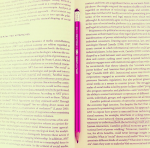This year I’m joining Academic Writing Month, aka #AcWriMo.
November is the writing month! Academics have their own version of National Novel Writing Month called ‘Academic Writing Month’, better known in the twittersphere as #AcWriMo. The idea was announced here by the academic writing website PhD2Published.
 #AcWriMo revolves around the following principles:
#AcWriMo revolves around the following principles:
Formulate a goal. Put time in your calendar (days of november) to work on it. The essence is having a concrete goal you commit to and work towards achieving. This concrete goal is in GTD terms a ‘project’ that you break down into smaller actionable (manageable) pieces (e.g. write 350 words a day, edit or revise a piece you have already written down, write for 2 hours a day, or say 4 pomodoros etc.). It’s important for you to state daily accomplishable goals.
Declare it to the world! There is an accountability factor to #AcWriMo. You are not alone, there is a whole public revolving around the twitter hashtag #AcWriMo. That’s how I came across the phenomenon; on twitter. In a google doc spreadsheet you can state your overall goal, plan (strategy) and actual achievement progress. What makes the experience special, is the feeling that you form part of a community. A writing community comes into being thanks to the hashtag/spreadsheet. You are part of a community of academics around the world all working towards a writing goal. On the meta level we are more aware also of the writing process on itself. This accountability factor works for me very well. At work I’m part of a small phd accountability group and you can’t imagine how awesome it is to discuss your progress with others; we support each other. Even if I don’t know the people using the hashtag, or the ones who have written down there names in the spreadsheet -personally-, you can read about their progress, you feel connected to them. This makes the writing process a more humane and social process.
Draft a strategy. Instead of ‘binging’ in order to accomplish a paper deadline and feel ‘fried’ afterwards (I have completed a couple of papers this way) you can spend some time thinking and reflecting in order to come up with a more sustainable writing strategy. It’s more than just planning. It’s also a mental preparation thing, envisioning yourself writing and preparing the physical and media-saturated environment for the cause (cleaning your desk of all distracting stuff or stop checking your Facebook newsfeed). It’s about setting time during the day, during the week, and in the month of November, in order to progressively accomplish your goal. PhD2Published emphasizes the importance of having a strategy as follow:
Don’t start AcWriMo without doing a bit of planning and preparation. Get some reading done, carve out time slots in your schedule to dedicate to writing, even buy your favorite coffee
Keep track of your progress (and talk about it with others!). You will see that writing is a labor of love, the more you invest in it, the better you will become at it. Academic writing on itself is a multifaceted process. it’s about developing writing habits and skills that can help you advance as a writer. This involves: planning, mind-mapping, drafting the structure of the paper, reading and taking notes, writing a specific part, feed-backing, concretizing your arguments, re-writing, (killing darlings) and did I say re-writing?! But also other ‘stuff’ like having more patience, dedication, discipline, a writing routine, structure, taking breaks and celebrating each step of the way. This article on 10 ways you can write everyday taught me how to start perceiving academic writing in diverse ways than just putting words in a linear way on a blank paper/screen. Doing all this in a crowd is the added-value, it’s like being part of a cool party of writers.
Although November is a busy month for me full of other responsibilities, I will do my utmost in keeping my daily writing goals.